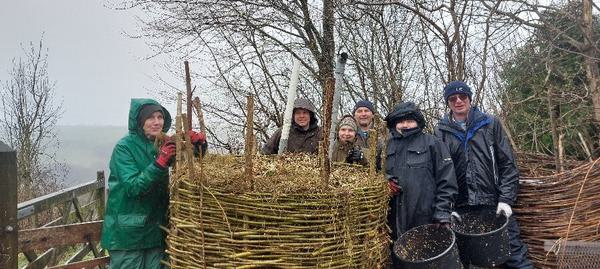Popular funding scheme renewed until 2026
Defra Minister Steve Reed yesterday confirmed the extension of the Farming in Protected Landscapes programme for one more year until March 2026.
The National Landscapes Association and National Parks England welcome the renewal but urge government to give a longer-term commitment to support farmers to deliver on international climate and nature targets while continuing to feed the nation.
A report jointly published by the National Landscapes Association and National Parks England highlights some of the key achievements since FiPL was introduced in 2022:
- 840 projects delivered to reduce flood risk
- 204,000 trees planted
- 3400+ educational visits funded
- Over 7000 farmers and land managers engaged
- Almost 200 farm clusters, supporting farmers to work together supported
- 422 ponds created or restored
- 150 monuments at risk supported
The programme, which is worth £30m for the year 2025/26, directs funds to farmers and landowners within National Landscapes and National Parks. The innovative model is unique in blending national, regional and local priorities and devolving decision making to local experts, while funding farmers to deliver against national targets. It fills gaps not met by other farming funding programmes, especially for smaller landholders. Contributions to nature recovery and climate resilience, sustainable businesses, social wellbeing and community building, heritage conservation and better access for people to enjoy our nation’s landscapes feature in programme delivery, all coming together to make much more resilient rural places.
Farmers are instrumental in the UK’s efforts to mitigate the effects of climate change, restore nature, clean up our waters and feed the nation. The FiPL programme has been lauded by the farming and land management community with 88% of surveyed FiPL participants saying they would recommend the programme to others.
John Watkins, Chief Executive of the National Landscapes Association said:
“While we welcome the extension of FiPL for another year, we urge government to consider a further extension of the programme. FiPL has been shown to deliver what this government says it wants – to help nature, reduce flood risk, clean up our water and support farm business diversification to keep rural communities sustainable. The structures and expertise are now in place and the Farming in Protected Landscapes model, rooted in local communities, has built trust and empowered farmers.”
Together National Landscapes and National Parks make up around 25% of the area of England. In October 2024, Defra submitted its plans on how the UK will achieve the UN target of 30% of land and sea protected for nature by 2030. The plans specified that UK’s Protected Landscapes should ‘provide the backbone to 30by30 in England, contributing towards the target where they are effectively managed and delivering in-situ conservation. We recognise that we can, and must, go further within Protected Landscapes than other areas to meet our national environmental targets, including 30by30.’
Jayne Butler, CEO of National Parks England said:
“Extending Farming in Protected Landscapes funding will have multiple benefits that will ripple across our rural communities in National Landscapes and National Parks. It will enable farmers to keep delivering the many brilliant initiatives that achieve positive outcomes for both nature and the rural growth agenda, it will also provide an opportunity to embed what has been learned from FiPL into wider agri-environment schemes, giving famers more confidence in a future where nature and climate can be balanced with food production. We would like to see FiPL continue for the long term to support the farmers in protected landscapes to contribute their outsize share in delivering the UK’s international climate commitments.”
Jonathan Dimbleby, broadcaster and patron of South Devon National Landscape said:
“It is hard to exaggerate the value of the Farming in Protected Landscapes Programme. As I have discovered firsthand during visits to farmers in South Devon National Landscape, the Programme allows them to develop innovative ideas that deliver important nature and climate outcomes as well as making their businesses far more resilient. The farmers I talked to especially liked the flexibility and tailored advice they get from a knowledgeable local farm adviser. This sets FiPL aside from other programmes. 33 of South Devon’s 107 FiPL projects engaged with schools, community groups or volunteers performing a vital role in linking ‘farm to fork’. The programme extension will enable Protected Landscapes to deliver many more projects to meet national, regional and local priorities, encouraging more farmers to engage with agri -environment schemes that benefit all of us.”
Dave Oates, who farms at Rosuick Farm on the Lizard Peninsula in Cornwall said:
“FiPL is the funding I’ve waited decades for. Farming in unique landscapes requires flexibility, every farm is different. The National grants programmes don’t take local needs into account. Ensuring that funding programmes support smaller farms is essential to meet the nature and climate challenges we face and to keep rural communities sustainable.”
Geoffrey Probert who farms in the Dedham Vale National Landscape said:
“I am appealing to the Defra ministers and officials to keep FiPL going for the long term. Over the last three years farmers in the Dedham Vale have undertaken about 50 projects, some of them on individual farms and many of them across multiple farms. I was at a meeting of the 20 Farmer Clusters across Norfolk & Suffolk who collectively farm over 300,000 hectares and the message for those in National Landscapes was the same – keep FiPL!”
Since the inception of the programme, National Landscapes and National Parks teams worked with over 7000 farmers on projects to benefit climate, nature, people and place through FiPL. Teams have supported Defra to get £59m of funding to farmers to deliver nature friendly farming and access projects including 840 projects to reduce flood risk; 184 miles of hedgerow planted and the creation of 95 permissive paths.



